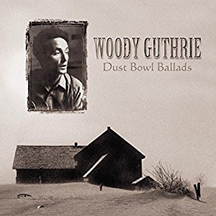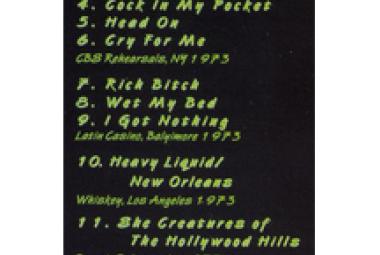Dust Bowl Ballads is an album by Woody Guthrie, recorded for Victor Records in Camden, New Jersey in 1940. It was Guthrie’s first commercial recording and the most successful album he made. It is considered to be the first or one of the very first concept albums. The Dust Bowl Ballads was originally released as two three-disc collections of 78 rpm records, omitting two songs. In 1964, during the American folk music revival, a reissue including all tracks from the sessions was released in LP format by Folkways Records after RCA Warner refused Guthrie’s request to re-issue the album. The complete Dust Bowl Ballads remains available on compact disc, audio cassette, and digital upload through the Smithsonian Institution’s Folkways Collection. (More from Wikipedia)
Woody Guthrie’s first recordings were made by Alan Lomax, the famous folklorist that I wrote about in my last post; they had several hours of recordings and conversations between them. His first album, Dust Bowl Ballads (1940) followed. It is regarded as one of the very first concept albums and was Woody’s most successful record.
The best known song on the Woody Guthrie album Dust Bowl Ballads is “So Long, It’s Been Good to Know Yuh” (called “Dusty Old Dust” on the album). The Weavers had a hit with “So Long (It’s Been Good to Know Yuh)” in 1951, taking it to #4 on the pop music charts and becoming one of their “staple” songs. From Wikipedia: “The repetitive chorus has been described as ‘a witty, black retort, utterly negative and apocalyptic’”:
We talked of the end of the world, and then
We’d sing a song an’ then sing it again
We’d sit for an hour an’ not say a word
And then these words would be heard:
So long, it’s been good to know yuh
Another song on Dust Bowl Ballads, “Pretty Boy Floyd” has one of Woody Guthrie’s most famous lines. Like the outlaw couple depicted in the 1967 film Bonnie and Clyde, Pretty Boy Floyd was a bank robber during the Depression era. While he was elevated to “Public Enemy No. 1” by the FBI following the shooting of John Dillinger, many see Floyd as a tragic figure who was a victim of his times.
“Pretty Boy Floyd” also highlighted the outlaw’s generosity, which was attributed to Bonnie and Clyde as well in the Warren Beatty/Faye Dunaway movie. In part, the lyrics of this song are:
Yes, he took to the trees and timber
To live a life of shame;
Every crime in Oklahoma
Was added to his name.
But a many a starvin’ farmer
The same old story told
How the outlaw paid their mortgage
And saved their little homes.
Others tell you ’bout a stranger
That come to beg a meal,
Underneath his napkin
Left a thousand-dollar bill.
Sure, anyone could say that Woody Guthrie was romanticizing a criminal. But there is no denying the power of the closing verses as Woody Guthrie points his finger at a greater enemy:
Yes, as through this world I’ve wandered
I’ve seen lots of funny men;
Some will rob you with a six-gun,
And some with a fountain pen.
And as through your life you travel,
Yes, as through your life you roam,
You won’t never see an outlaw
Drive a family from their home.
I have written previously of another song on Dust Bowl Ballads, “I Ain’t Got No Home”. Although Bob Dylan idolized him, it is one of the very few Woody Guthrie songs that Dylan recorded. Also, “I Ain’t Got No Home” virtually shares a title and many of the lyrics with one of the songs by past UARA Ron Franklin, “We Ain’t Got No Home”. It is hard not to simply list the total lyrics to Woody Guthrie’s songs, they are so organically written; here are two choice verses from “I Ain’t Got No Home”:
My brothers and my sisters are stranded on this road,
A hot and dusty road that a million feet have trod;
Rich man took my home and drove me from my door
And I ain’t got no home in this world anymore.
Now as I look around, it’s mighty plain to see
This world is such a great and a funny place to be;
Oh, the gamblin’ man is rich an’ the workin’ man is poor,
And I ain’t got no home in this world anymore.
In the same time period that he released Dust Bowl Ballads, Woody Guthrie was one of the co-founders of the Almanac Singers, which were active between 1940 and 1943.
(March 2015)















